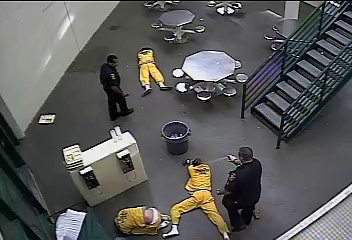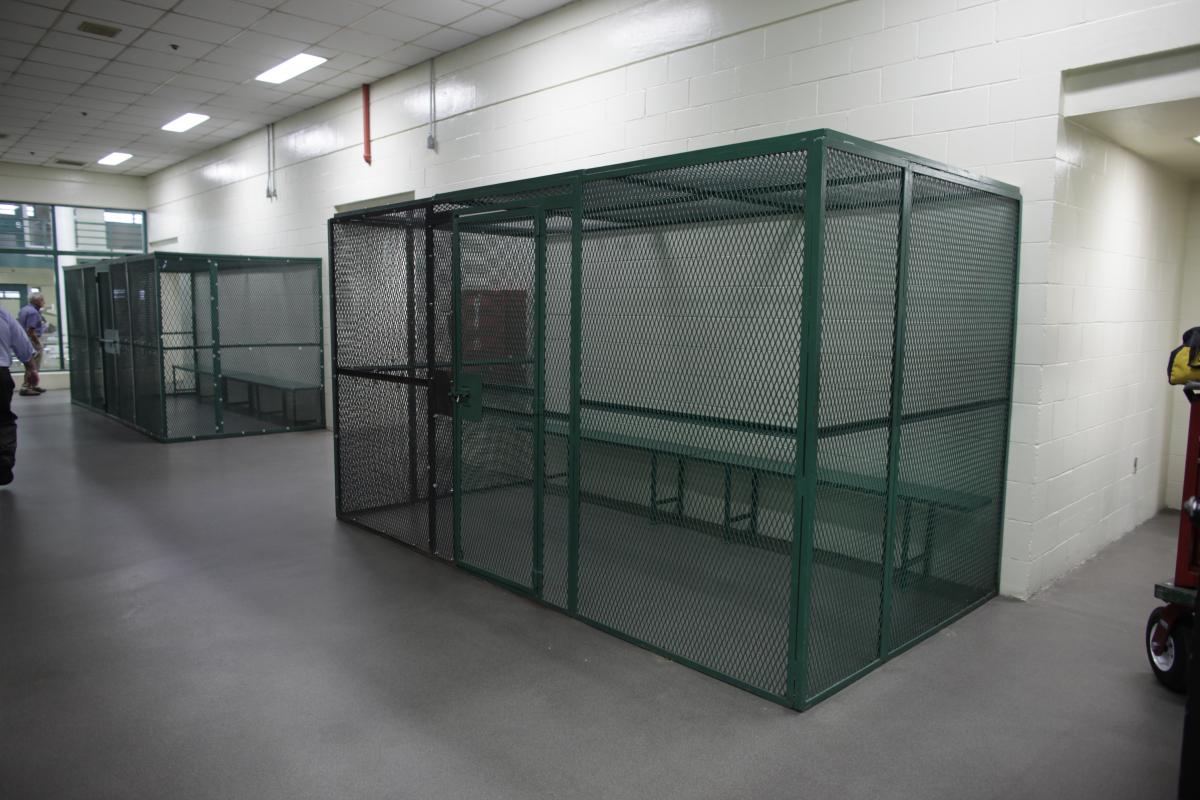Disposable youth: Florida case highlights failed policies of placing children in adult jails
The SPLC is presenting evidence in a federal court trial in Tampa that children held in the Polk County, Fla., jail were routinely brutalized, subjected to verbal and physical abuse by guards, and denied proper health and rehabilitative services. The case illustrates why children should not be held in adult jails.
They were known as “test of heart” fights.
Children entering Florida’s Polk County Jail were challenged to these fights by other children. It was a way to test the toughness of a newcomer and establish his place in the pecking order. Losing – or simply looking weak – had consequences beyond blood and bruises. Younger, more vulnerable children sometimes had to give up their food to older children or risk a beating, a practice known in the jail as “payroll.”
When Lisa Jobe’s son, K.J., ended up at the Polk County Jail, she could see the tell-tale signs of the 15-year-old living under the constant threat of violence.
“He was always looking over his shoulder,” she said. “You never know when you’re going to be the person that’s going to be jumped next.”
When K.J. was beaten in jail, no one called his parents. His mother learned about it when she visited him and saw her son’s black eye and swollen face. K.J. was transformed by his experience at this adult jail, which has been modified to hold children facing juvenile charges.
“It broke his spirit,” Jobe said. “He was just a different child. He felt there was no hope.”
There’s good reason for children at the Polk County Jail to believe there is no hope: The guards knew about “test of heart” fights. They knew about “payroll.”
They did nothing.
The guards lacked even the basic training needed to supervise children at the jail, some as young as 8 years old. It’s a failure that has led to pervasive abuse, neglect and violence. It’s a place where a deputy tried to provoke fights with children in cells that lacked cameras to capture his actions. It’s where suicidal youths were placed alone in kennel-like cages for long stretches with little human contact.
And it’s where deputies doused children with pepper spray for minor infractions such as talking back or dressing too slowly – a practice that a federal judge earlier this year said puts Polk County Sheriff Grady Judd at odds with the rest of the nation.
The Southern Poverty Law Center in 2012 filed a federal civil rights lawsuit against the sheriff to stop the unconstitutional violence and neglect occurring under his watch. The trial, expected to last four weeks, begins today in Tampa.
SPLC attorneys will present evidence showing that children are routinely subjected to physical and verbal abuse by guards, and that the sheriff has failed to provide children in his custody with adequate educational and rehabilitative services.
A bad law, a bad decision
The story of the Polk County Jail and the children held there has ramifications far beyond the borders of this largely rural county in the center of the Florida peninsula. It is an example of misguided juvenile justice policies that ignore decades of research showing that exposing children to adult jails leads to more crime, not less.
“This lawsuit illustrates that children simply do not belong in adult jails,” said Tania Galloni, SPLC managing attorney. “The Supreme Court has ruled that juvenile detention is for the purpose of rehabilitation, not punishment. Mistreating and housing children in close proximity to adult offenders only assures a high recidivism rate, at great cost to the children, their families, communities and taxpayers everywhere.”
The Polk County sheriff began housing children at the county jail in October 2011, shortly after Florida passed legislation allowing county commissions to place children charged as juveniles in adult jails. The new law also allowed counties to no longer follow Department of Juvenile Justice standards developed over many years – reversing more than 40 years of efforts to create safeguards and meaningful rehabilitative programs for vulnerable children.
Since that time, the sheriff has housed more than 100 children in the Polk County Jail. The vast majority are there for nonviolent offenses – and most are simply awaiting court dates, because children are not entitled to bail.
“Sheriff Grady Judd promised to save tax money by housing children in the county’s adult jail. But any savings he has generated have come at the children’s expense,” Galloni said. “It’s easy to run a jail on the cheap when you scrimp on staffing, create abusive conditions and deny children the services to which they are entitled under federal law.”
Research vs. rhetoric
A number of states around the country have passed legislation barring the placement of children in adult jails. Nevertheless, there remain policymakers and law enforcement officials who want to turn back the clock in the name of getting tough on crime.
But the evidence doesn’t support their idea of justice for children.
Youths in the adult criminal justice system are 34 percent more likely to be re-arrested than those in the juvenile court system who are convicted of similar offenses, according to the Centers for Disease Control.
Children in adult facilities also face a higher risk of sexual victimization, according to the National Prison Rape Elimination Commission.
Rather than being “scared straight,” a child may simply become numb to violence as a way of coping, leading him or her to accept it as commonplace. Children also can become groomed for a life of crime, according to the Office of Juvenile Justice Delinquency and Prevention, a division of the U.S. Justice Department.
As for Polk County, Sheriff Judd’s claims that his punitive policies reduce crime don’t stand up to scrutiny. According to Florida Department of Law Enforcement statistics, the county hasn’t seen any more of a significant crime drop than the rest of Florida, which has not adopted such policies.
‘We shouldn’t give up on them’
The approach embraced in Polk County and elsewhere doesn’t put young lives back on track. It derails them. It abandons children to an adult world of brutality and desperation. It’s a world that can swiftly destroy any sense of hope, convincing even the youngest child that he’s already broken beyond repair. Lawmakers and sheriffs armed with clever sound bites about getting tough on incorrigible children and young thugs only encourage these children to take those toxic labels to heart.
The desperation increases the likelihood that children held in adult jails will attempt to take their own lives. The Justice Department has concluded that they are 36 times more likely to commit suicide than those in juvenile detention facilities.
In the Polk County Jail, according to the lawsuit, children who need suicide protection are forced to strip naked in front of other children and don a “suicide suit,” a garment that leaves their bodies exposed. They are then placed in a kennel-like structure with nothing but a hard, wooden bench. They are kept in the cage for 23 to 24 hours a day, deprived of adequate mental health care and prohibited from participating in educational or recreational activities.
The SPLC lawsuit describes how K.J. felt humiliated and degraded when he was placed in such a cage as punishment for engaging in horseplay. He was later put in a cage with another youth who was deemed suicidal. After the two started singing, and continued after being told to stop, a guard sprayed a can of pepper spray around the cage, burning K.J.’s eyes and skin, and making him choke and vomit. Other guards stood by, laughing.
K.J. was eventually transferred to a juvenile facility, away from the violence of the Polk County Jail. But many other children remain there, mostly waiting for their day in court.
“These are children who’ve made mistakes, but we shouldn’t give up on them,” said K.J.’s mother. “And, that’s what it seems like has happened at the Polk County Jail. They’ve given up on the children and they’re just locking them up.”



